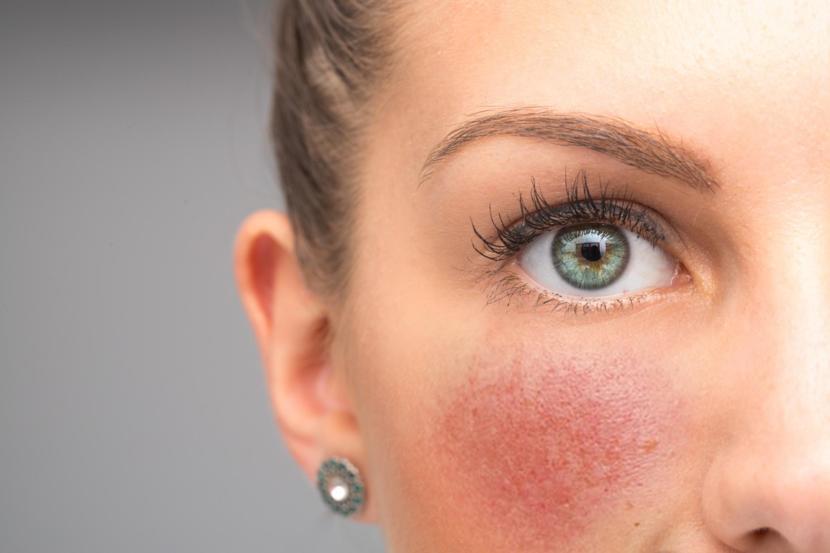Rosacea Awareness Month

Dr. Francisca Kartono practices dermatology in Northville, MI. Dermatology is a medical specialty that focuses on the understanding and treatment of diseases of the skin, hair, and nails.
Let’s talk rosacea. April is Rosacea Awareness Month!
Here are a few questions and answers regarding rosacea, a common red-face disorder that affects roughly 16 million Americans with a chronic course.
- What is rosacea?
Rosacea is a chronic skin condition where facial blood vessels open and close irregularly and can cause persistent, frequent, and oftentimes severe facial redness. Depending on the type of rosacea, sometimes they may experience facial spider veins, acne cysts, styes, and thickened facial skin. The recent mandate to use masks due to COVID-19 has exacerbated rosacea flares in many due to trapped heat and friction to the central face.
2. Are there really mites on my face if I have rosacea flares?
Yes, there are mites called Demodex on our skin that can contribute to flare-ups of rosacea. These mites like to live on the nose and cheeks where rosacea tends to flare. Studies have found that when these mites overgrow on the skin, rosacea symptoms can be found. It is thought that the presence of too many of these mites can mount an immune response that results in typical red rosacea bumps. Many rosacea patients have large numbers of this mite on the skin, in their oil glands. However, some people who do not have rosacea can harbor these mites as well.
Besides an overabundance of Demodex mites, other common rosacea triggers include sun exposure, emotional stress, hot or cold weather, wind, heavy exercise, alcohol, spicy foods, heated beverages, humidity, and certain skin-care products.
3. Are niacinamide-containing products good for rosacea?
Yes, niacinamide-containing products are suitable for rosacea-prone skin. Niacinamide is a VitaminB3, and can be useful in treating acne and rosacea. It increases the barrier function, which allows better tolerance in the skin against irritant reactions. It also has anti-inflammatory effects and is very suitable for sensitive, rosacea, or redness prone skin. It has also been shown to have an effect to reduce the risk for skin cancer formation when taken at sufficiently high oral dosages.
4. Besides the skin, what else can affect and be affected by rosacea?
Many things have been found to trigger worsening of rosacea, or rosacea flares. But scientists are still trying to figure out what exactly causes rosacea. In rosacea studies, the following has been found:
- Rosacea runs in families, and it is possible that people are inheriting genes that cause rosacea symptoms.
- The immune system plays an important role. The presence of certain bacteria such as H. pylori, and Demodex mites in the oil glands in the skin, may cause an immune reaction that triggers rosacea.
- Certain proteins of the skin called cathelicidins may be responsible for causing the redness and swelling we see with rosacea symptoms.
- In half of rosacea patients, the eyes can be affected, leaving it prone to have persistent red or bloodshot eyes appearance, watery eyes, and reduced visual acuity.
- Psychological well-being is often improved ( ~60-80% based on surveys performed by the National Rosacea Society) when rosacea symptoms can be kept under control.
5. Any special skincare instructions for rosacea prone skin?
Yes, here are my 5 helpful tips to decrease signs and symptoms of rosacea:
- Avoid your triggers: wind chill, sun exposure, etc. Wear your sunscreen daily, even when you stay indoors, and reapply midday if possible.
- Use the correct skincare regimen: each person has a unique skin type, but as a rule of thumb, treat rosacea skin as supersensitive skin. Avoid fragrances, irritants, and be extra careful when incorporating anti-aging molecules such as retinol and retinoids.
- Ask your doctor about taking a short course of antibiotics from your dermatologist to rescue rosacea from too much inflammation.
- Consider using specialized prescription creams such as topical Ivermectin, metronidazole, or brimonidine to help calm inflammation in the skin. Discuss them with your dermatologist.
- Discuss the use of lasers with your doctor. It is not a miracle cure but may be a good addition to your rosacea routine if the budget fits.
It is important to recognize that a personalized, tailored long-term approach to rosacea symptoms can be achieved by working together with you dermatologist and can result in an improved quality of life.








